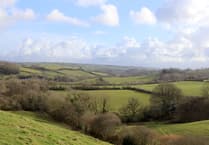AS Devon braces itself for another heatwave, the agricultural industry is facing ‘hugely challenging’ conditions for ‘all farming sectors’, according to National Farmers’ Union Deputy President Tom Bradshaw.
Ian Samuels, from Yelland Cross Farm, produces both vegetables and cattle: ‘We’ve got no grass so we’re having to feed silage to the cattle - we’re really going to have eke out our winter feed. The vegetables haven’t got any have any irrigation, so they’ll just have to take a chance.
‘We’re in a slightly wetter area than many parts of Devon, we had about eight millimetres of rain about a fortnight ago but that’s all evaporated. Every day it gets worse - regardless, the grass will take several weeks to recover anyway’
While Ian’s borehole is yet to run dry, another farmer living near Buckfastleigh has been less lucky: ‘I’ve got a 140ft borehole and I can only pump for three-quarters of an hour every six hours. My stock has run out of water, and all the water troughs are empty. We’ve had to put the stock in fields where there’s a stream, but the streams are down to a trickle so it’s pretty damn serious.’
Farming cattle, the severity of the current conditions will create knock-on effects throughout the year: ‘We’re on full rations and we’re already using a lot of hay… If we don’t get a good autumn we’ll have a very long winter.’
For crop farmers, the situation is far more immediate. Ed Scott, Assistant Harvest Manager at Riverford Farm described the state of affairs: ‘In one word, it is dire! We have completely run out of irrigation water: we have just enough to keep our most high-value crops going, but if it doesn’t rain soon we may have to decide to water one or the other.’
Although having six reservoirs and a licence to take some water from the nearby stream, Riverford farm is in crisis. Many crops are being written off, and those that survive have smaller yields and are of lower quality.
Tim Dickens, who runs the community-supported agriculture project Teign Greens, is having a similar experience: ‘We’ve made the decision to let go of some of our crops and not to water them, instead focussing on our polytunnels and high-value leafy crops just because we really can’t do everything. It’s really painful when you’ve put hours and hours of work in to plant things and water them early on, and then have to make the decision to abandon them.’
The UK Centre of Ecology and Hydrology is forecasting the drought conditions in the South West to last until October, as the ‘exceptionally low’ rivers and groundwater levels struggle to recover. Many farms are expecting these conditions to become increasingly common. Ed notes that at Riverford, they haven’t run out of water in 30 years. Now, it has happened twice in the last four years. ‘Extreme weather events are having more of an impact than anything. A steady rise in temperature/aridity is one thing, but we’re also seeing extra dry, extra cold and extra wet weather at unpredictable times, which makes it incredibly difficult, almost impossible to plan for.’
Tim Dickens said similarly: ‘For me, and this goes beyond farming and agriculture, I can’t see this being anything other than climate change driven. It’s scary because you realise that if this becomes the norm, our lives are going to drastically change.’
Climate-based factors are also exacerbated by more localised issues. Ed Scott said: ‘These problems are compounded by conflicting and useless messaging from the government, poorly planned infrastructure, and little or no green spaces within new builds.’
Ian Samuels said similarly: ‘There’s been next to no reservoirs built across the Westcountry over the last 50 years. We’re desperately in need of more winter storage and that’s exacerbated by the building of lots of new houses.’
The NFU’s Tom Bradshaw also echoed this sentiment: ‘The crisis highlights the urgent need for the government and its agencies to better plan for and manage the nation’s water resources to help build resilience into the farming sector.’
Looking forward, many farms are learning to adapt through building more water storage facilities and growing more heat and drought-resistant plant varieties. However, further investment and support will be required in order to keep our farms afloat.




